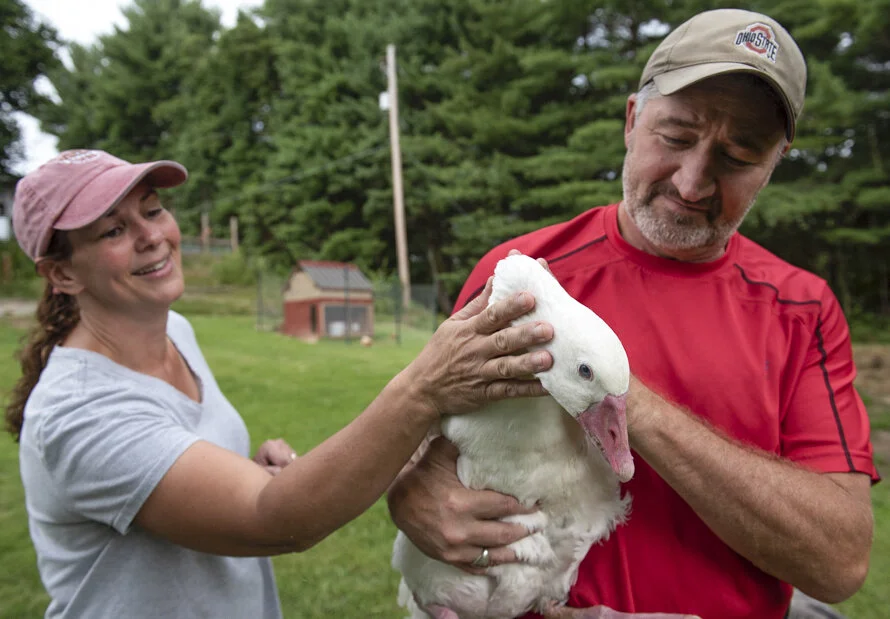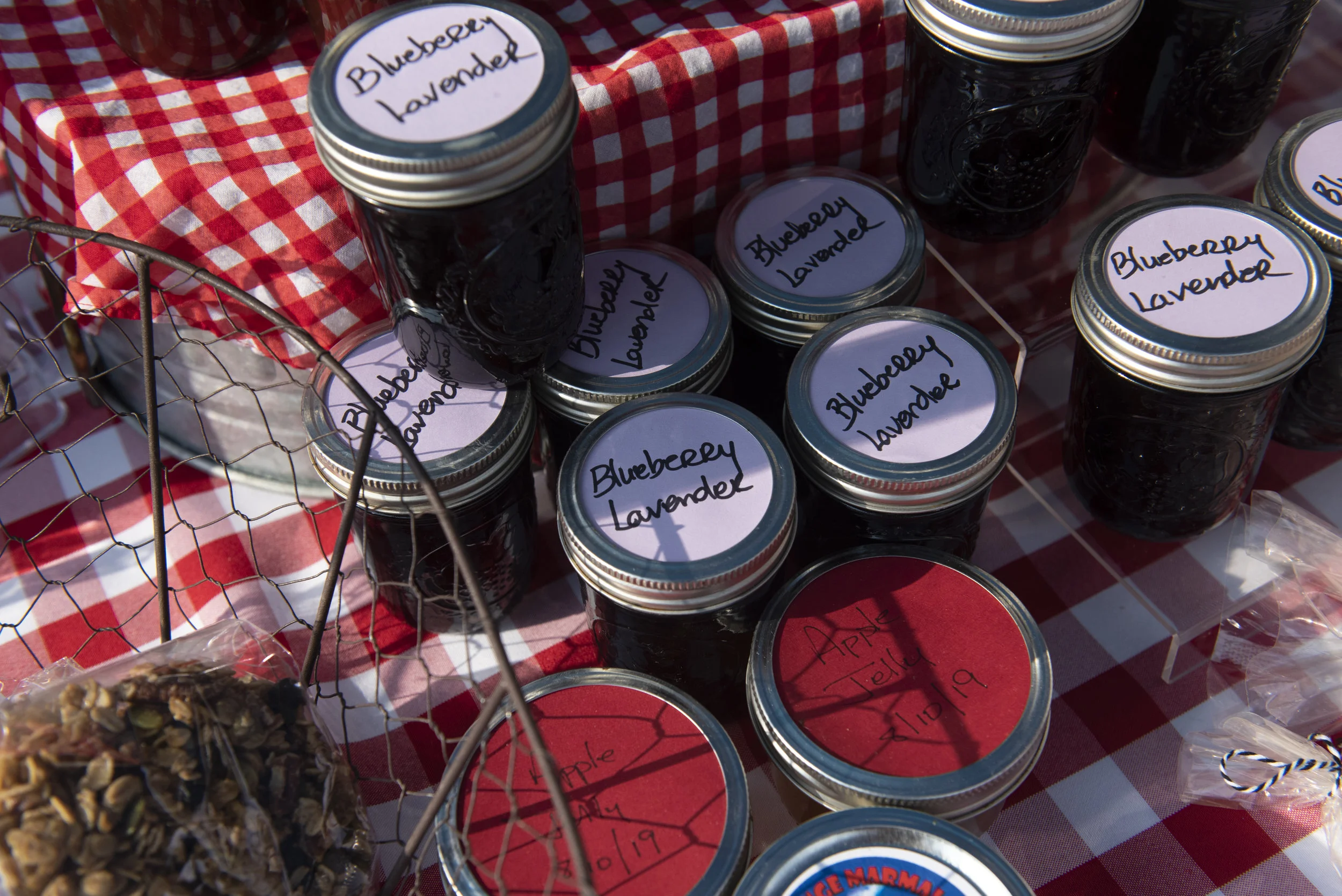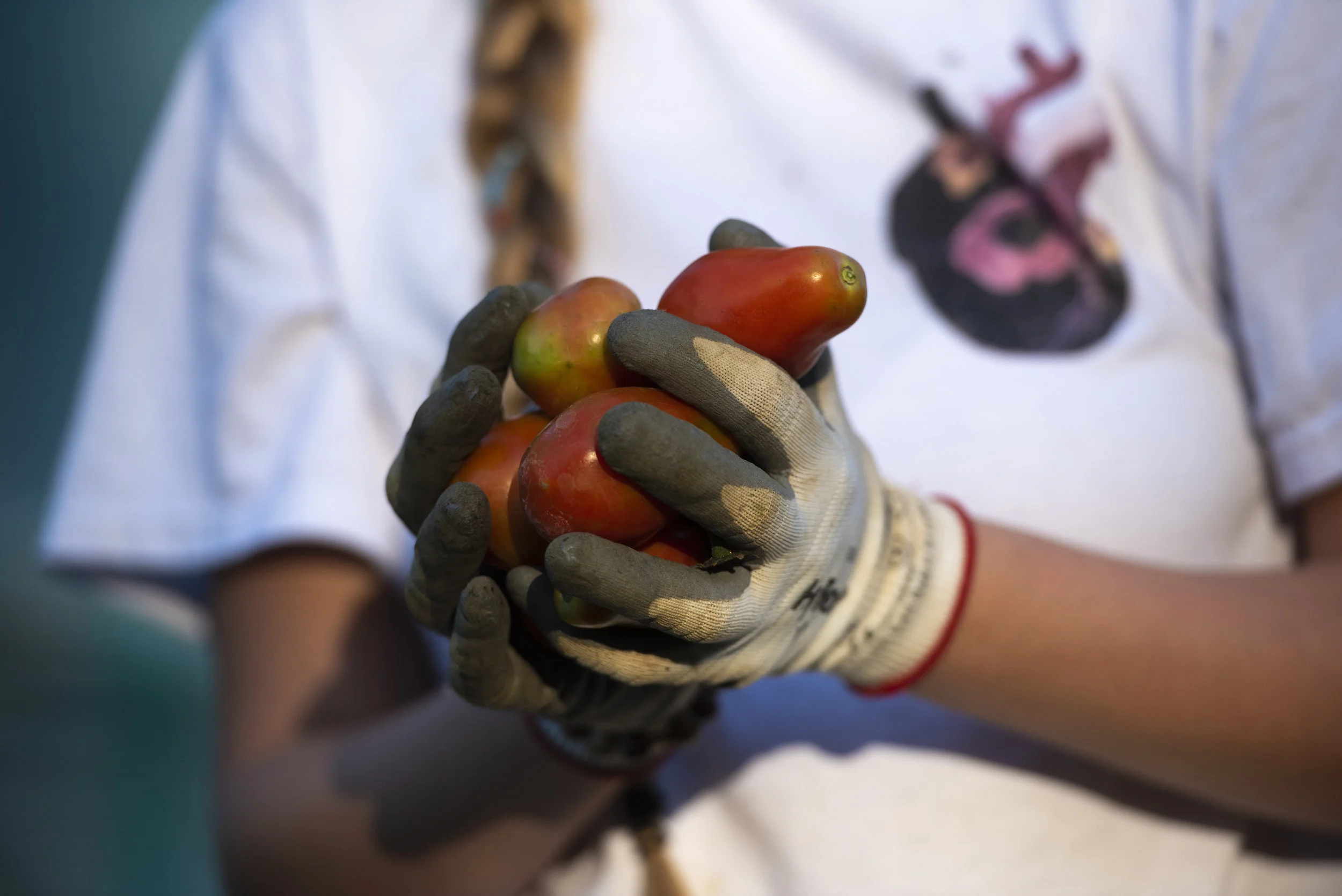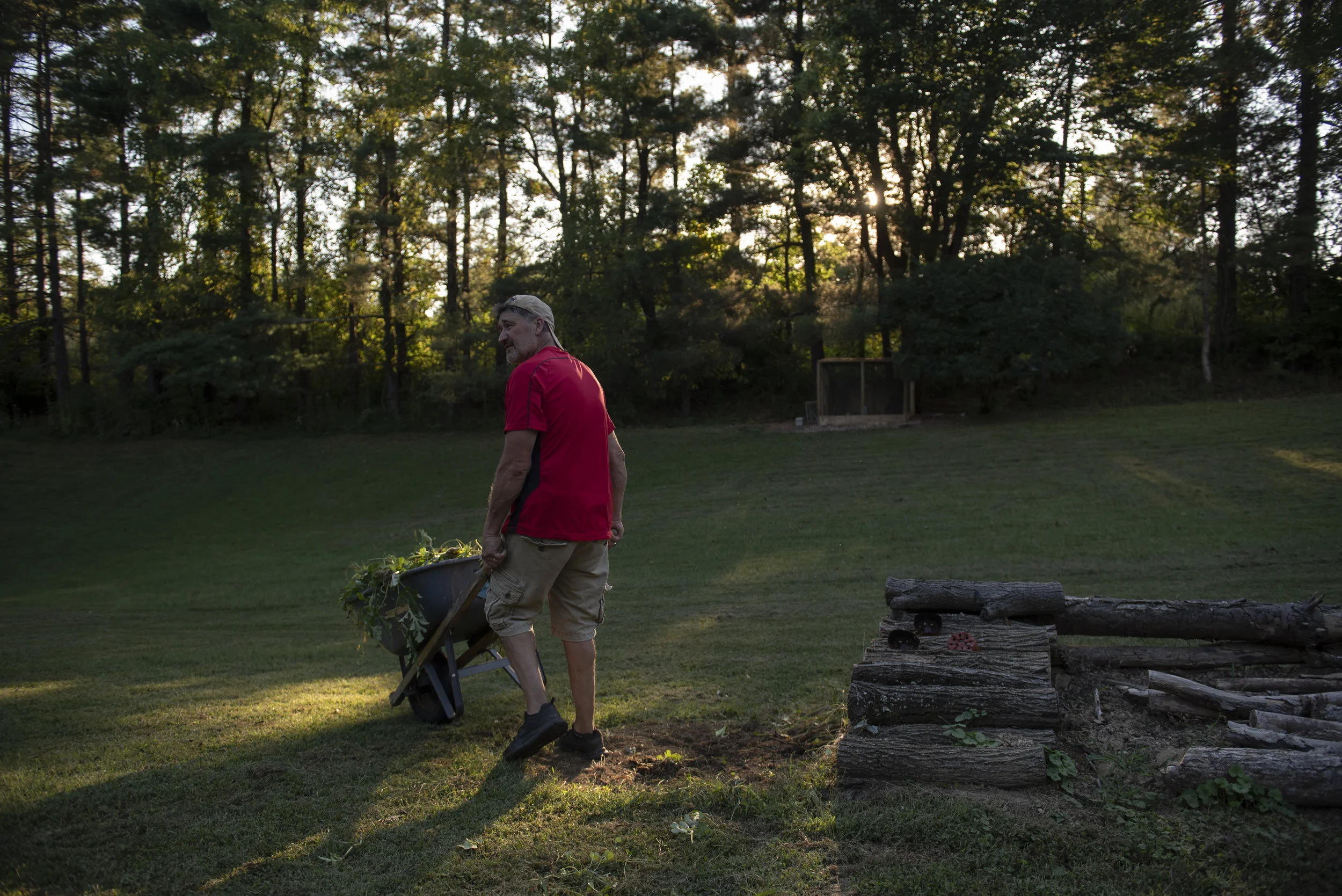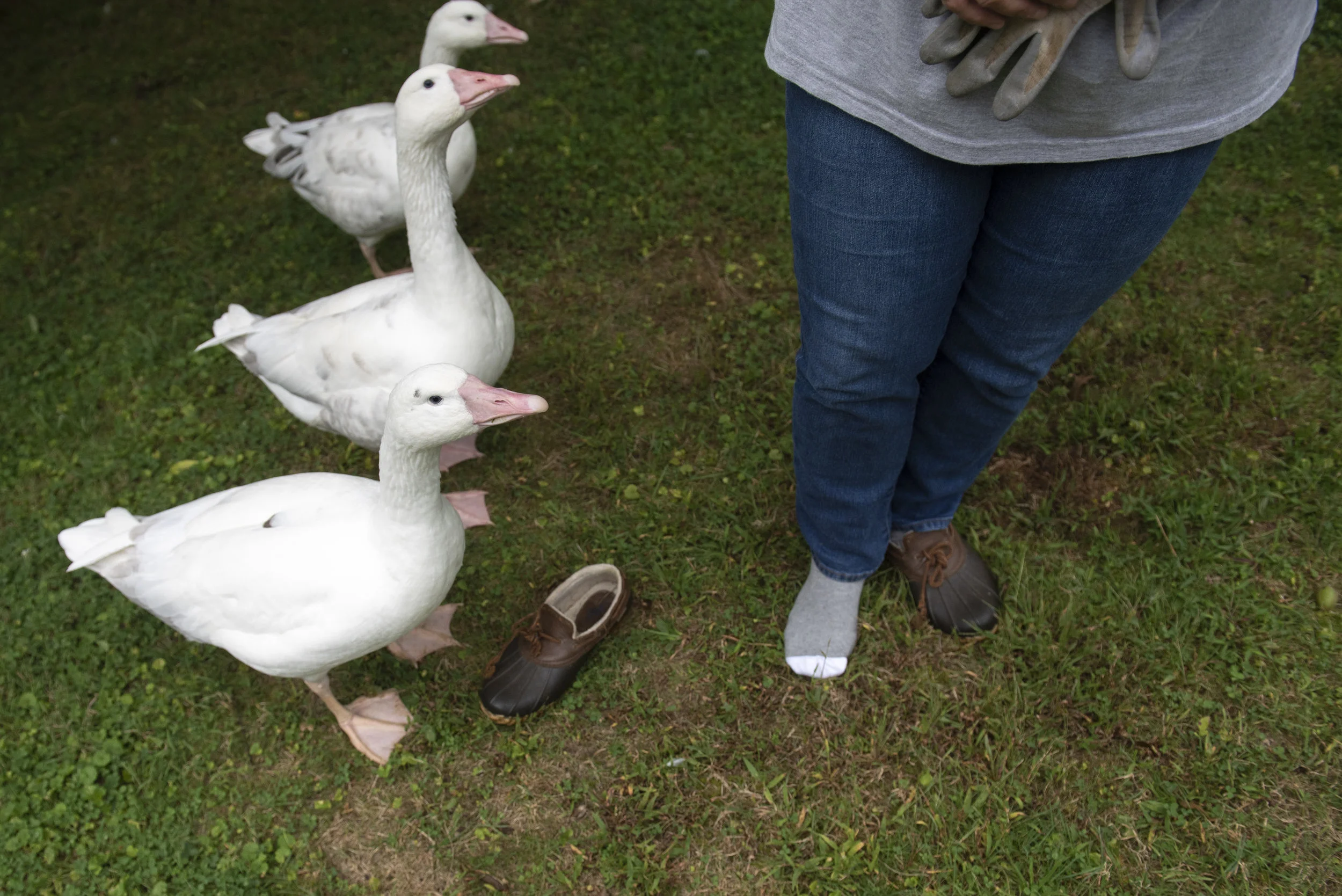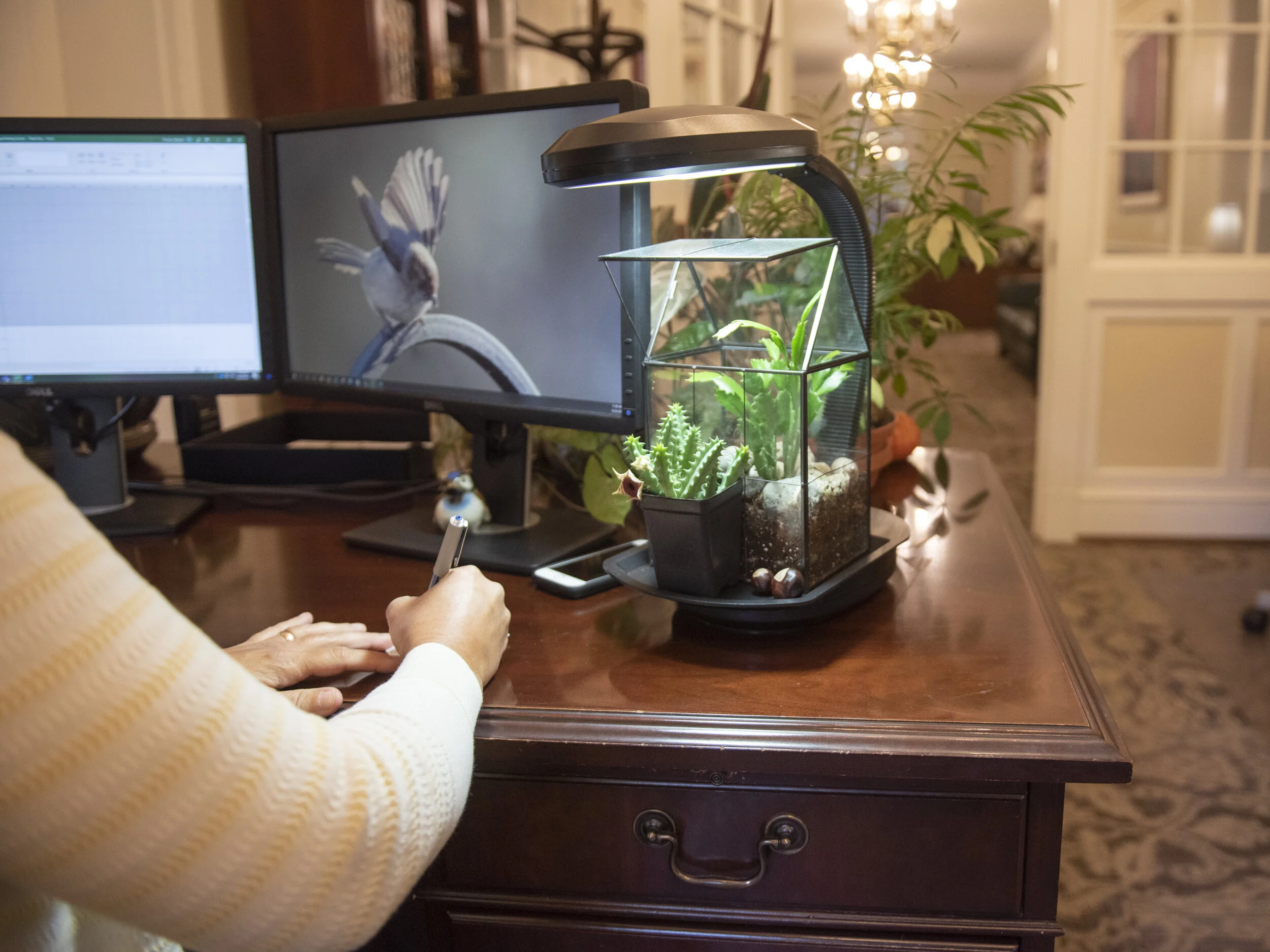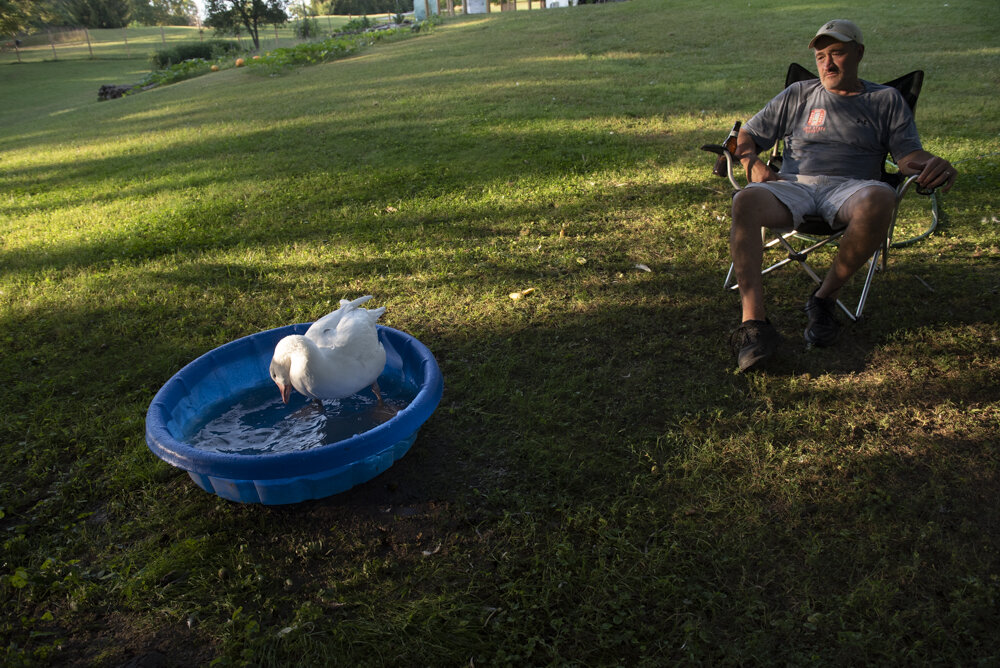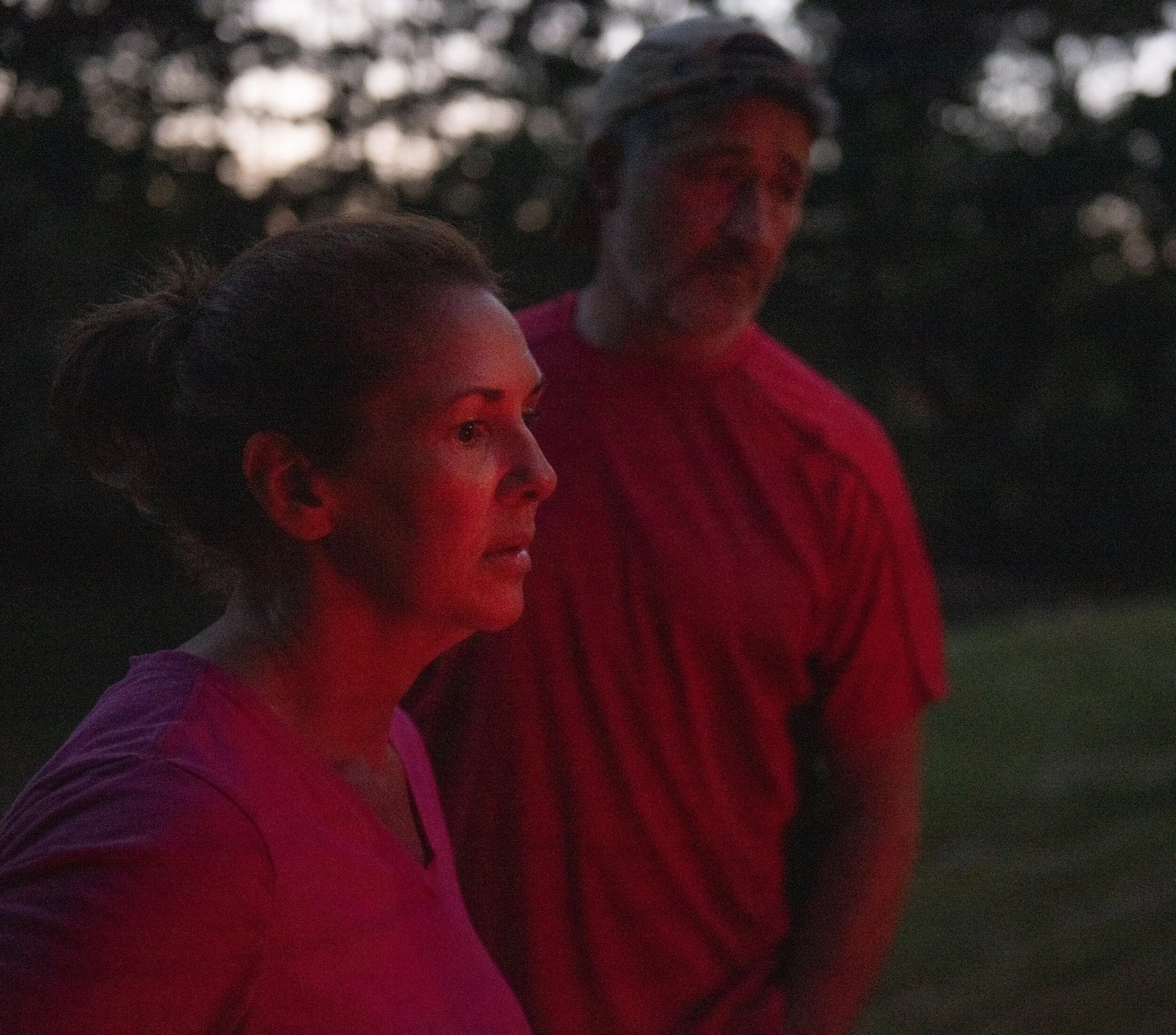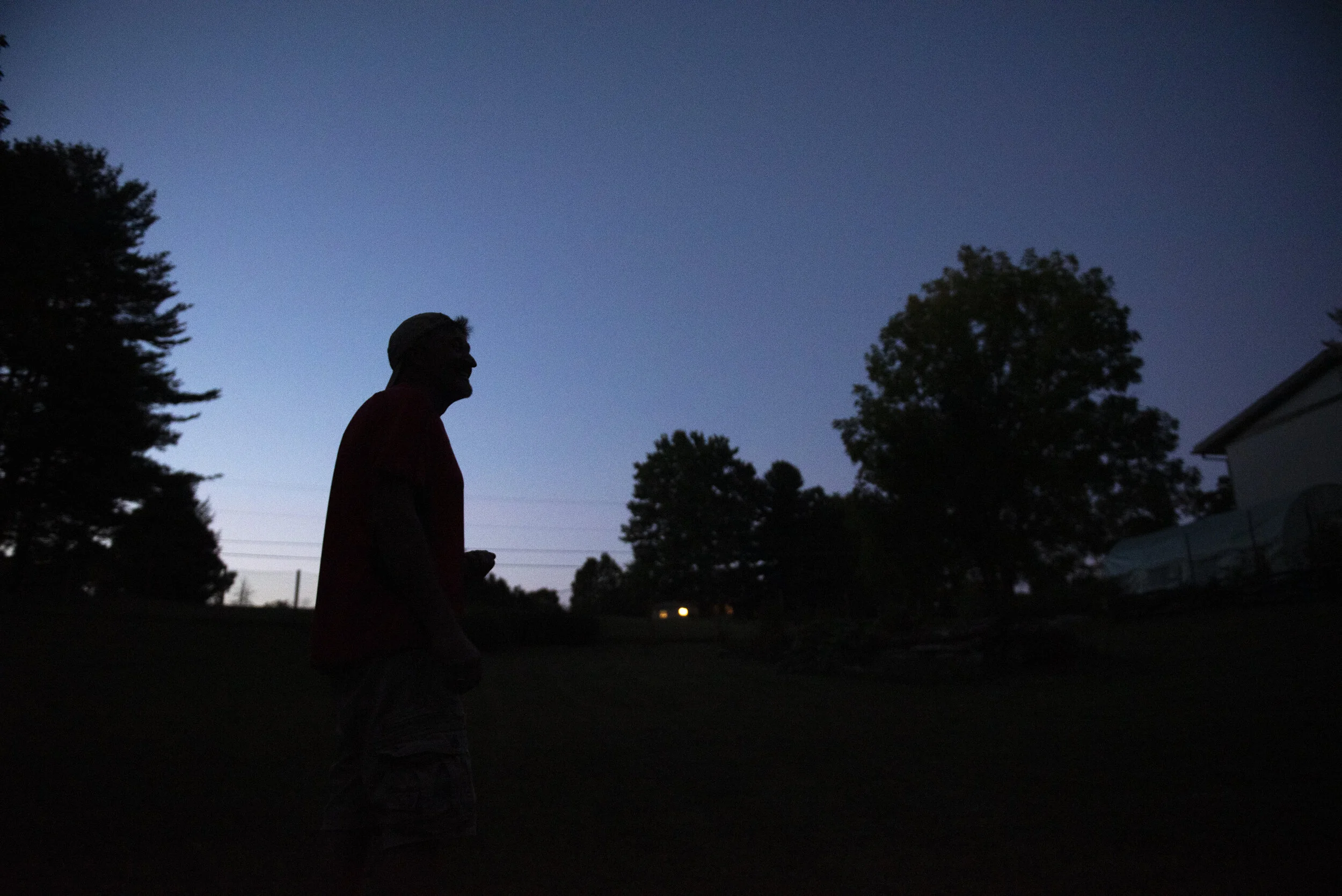A feather from a Cotton Patch Goose lays in the grass among some hay the Poches’ use for geese feed.
Permaculture farming in Appalachia
Couple uses sustainable methods to raise livestock and crops in their backyard
ATHENS, Ohio - Greg Poches wakes up early, often around 6 a.m. or so most mornings, to the sound of a mixer churning and an oven dinging. Marlene, his wife, has likely already been in the kitchen for hours baking an assortment of cinnamon rolls, bear claws, pies, cookies and jams. If it’s a Saturday, Marlene has likely been baking since 3 or 4 a.m. by the time the family leaves for the Athens Farmers’ Market at 8 a.m. Most of her recipes are original and memorized or come from a combination of cookbooks, including one documenting her family’s recipes through the years. The mornings when Marlene cooks, Greg jokes that he likes to leave her alone or he’ll get run over in the chaos.
Marlene Poches, left, pets Simon the goose as Greg Poches holds him. Simon, a Cotton Patch Goose, is mostly blind and is the only one of the Poches’ geese that will allow himself to be held willingly.
When the family arrives at the farmers market on Saturday mornings, Marlene greets regulars always with a smile in her slight Southern accent - indicative of her Tennessee childhood. Above their stand, a sign reads “Coolville Ridge Atomic Ranch” - the official name of their small farm named for the ridge their property lies on and the mid-century ranch house they live in built during the atomic era.
Blueberry lavender jam that Marlene made on display at the Poches’ stand at the Athens Farmers Market. Everything the Poches’ sells at the Farmers Market comes from their yard in some way.
Ohio University student Jess Fray holds misshapen tomatoes in her hands after helping Marlene pick them from the Poches’ yard. The tomatoes were then used in Marlene’s cooking.
At the Athens Farmers Market, vendors are required to grow their own produce and encouraged to practice sustainability, a practice Marlene takes to heart. Marlene uses no pesticides to grow her watermelons, pumpkins, cucumbers, tomatoes, flowers and other crops that she uses in her baking. The baked goods the couple sells are all homemade and each incorporate ingredients they grow themselves.
While Marlene is baking or tending to the crops, Greg is up and about taking care of eight chickens, 13 geese, four quail, bees and four dogs - two of which are Scottish Collies they plan to breed and train to herd livestock.
While Marlene prefers the geese, the quail are Greg’s prized possession. The Bobwhite Quail, a species that is struggling in Ohio, are very uncommon. Greg hopes the quail he’s raising will help restore the threatened population of quail in Ohio. Several of the neighbors have offered to participate in his project by helping to support the quail through the winters on their properties once released.
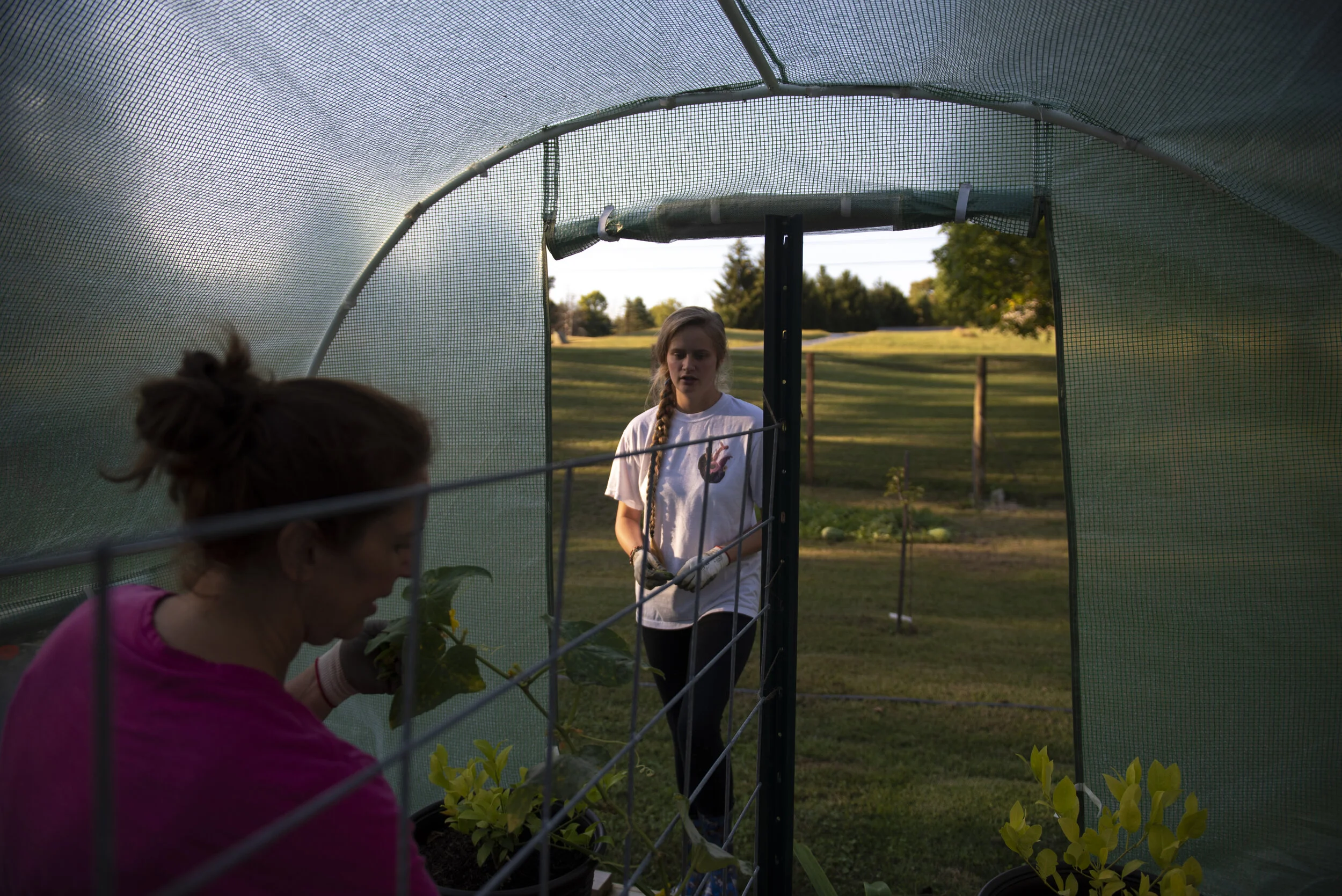
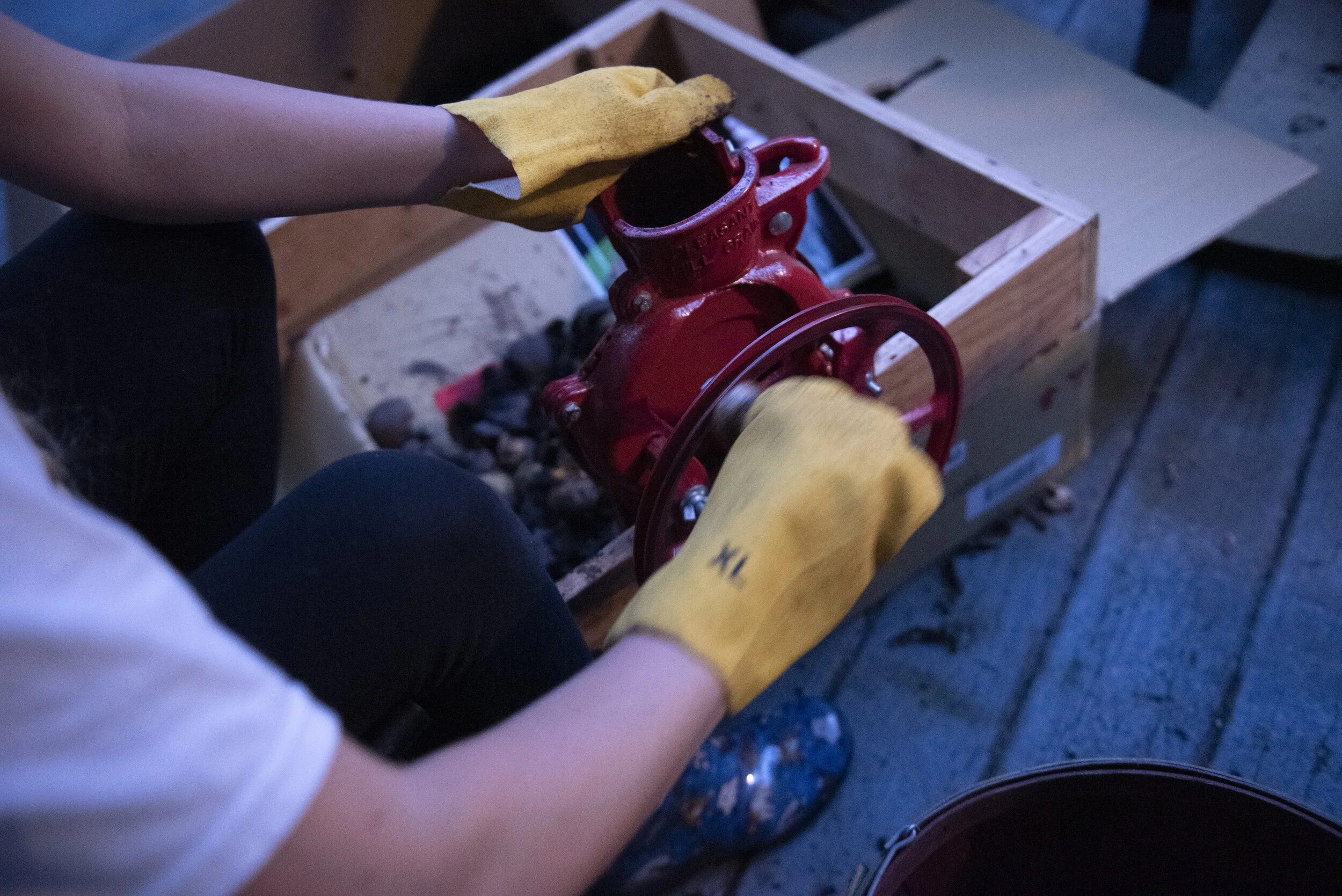
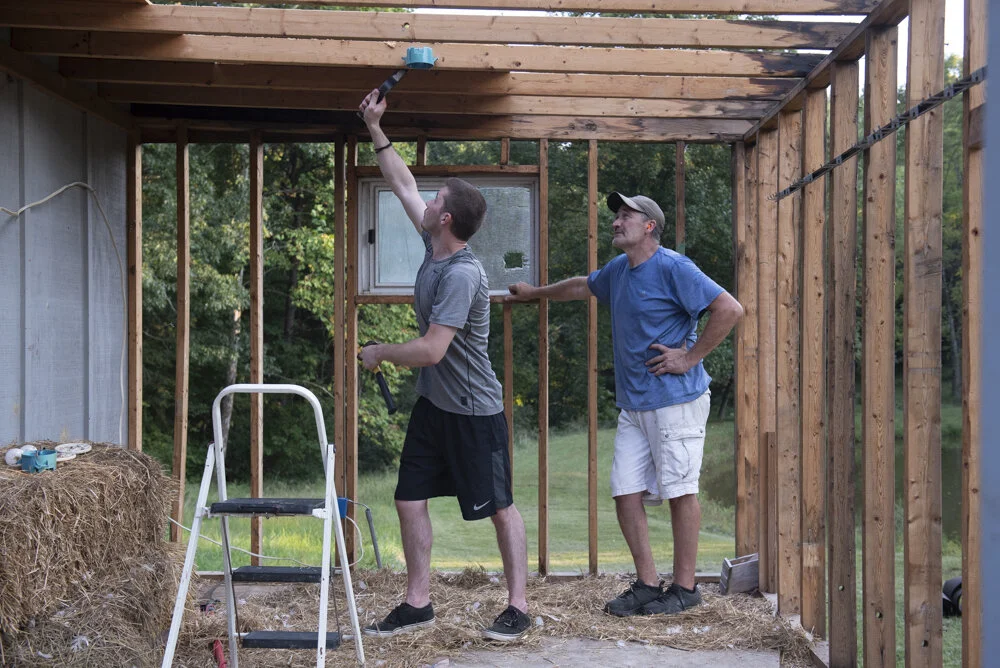
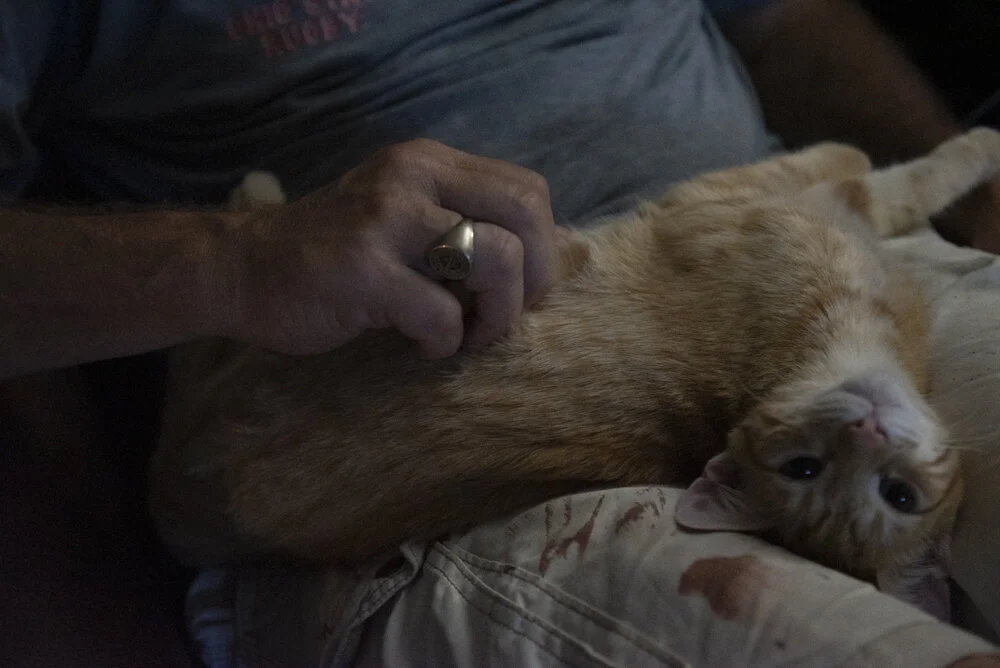

The Cotton Patch Geese that Marlene rescued from the Ozarks, and raised in two separate groups, follow Greg and Marlene around the farm like pets. They take baths in the evening in a shallow kiddie pool underneath the farm’s large pecan tree. According to Marlene, the geese are the most critically endangered type of American goose. When she rescued the geese, Marlene thought there were only a couple adult geese, but when she and Braden arrived in the Ozarks, there were several goslings along with the adult geese - who when she brought them back laid eggs, giving them two more geese.
Greg wheels compost in a wheelbarrow to a pile in the yard. The Poches’ try to use natural materials for their garden and create compost for reuse in the garden.
Greg’s current project is converting a shed used by the previous owners into a comfortable home for both sets of geese, complete with separate areas for geese couples so that the pairs won’t fight each other. The couple plans to breed and raise the geese, and then sell them to help repopulate the market. Marlene hopes that people will start using them more often on homesteads for eggs or meat. As for their own flock of geese, Marlene, who had been a vegetarian, has a hard time justifying killing them for meat and focuses instead on responsible breeding practices and educating the public on their usefulness as a utility goose.
“I normally only name animals that we know aren’t going to have something happen to them,” Marlene says. Most of their geese have names. She says if they do eventually convert some of their future geese into meat geese, she’ll have to distance herself from them.
Three of the Poches’ geese nibble on Marlene’s shoes as she leads them around the yard. The geese listen to and follow both Marlene and Greg.
The Poches family - Greg, Marlene and their son Braden - have only lived in Athens, Ohio for two years, but have owned different farms over the years in different locations around the country.
Greg, who is from Gahanna, Ohio originally and Marlene, originally from Chattanooga, Tennessee, met in Tennessee. Marlene also spent part of her childhood in the Middle East and Europe. Greg attended The Russ College of Engineering and Technology at Ohio University before moving to Tennessee. Together the couple moved to Illinois, Oregon and Washington and raised different animals at each home.
Plants from the farm sit on Marlene’s desk next to a bird background on her computer as she works at Ohio University as an Executive Assistant to the Vice Provost.
The family first moved to Ohio to live in Columbus where Marlene was employed by OSU and a part-time student majoring in Sustainable Plant Systems and minoring in Entomology, but Greg, who works in environmental health and safety, got a job in West Virginia, prompting a move to Athens which was the halfway point of their two commutes in opposite directions.
Currently, Greg spends his days building up the farm and working on infrastructure for the animals they care so much about. Between baking, working for OU, growing crops, working towards an applied plant science degree, Marlene barely sleeps. Greg supports her busy schedule by taking care of the farm during the day while she’s away.
Greg watches as one of the geese takes a bath in the kiddie pool. The geese bathe themselves in the kiddle pool every evening when the Poches’ let them out for their walk. Greg and Marlene raised many of the geese from birth.
The couple hopes to create a bakery in the lower level of their home with an outdoor patio that customers can come by and enjoy when picking up orders. Eventually, Marlene hopes their property will become a rural destination for locals, with watermelon picking in the summer and pumpkin picking in the fall. They also plan to clear out the undergrowth of the wooded area in the back of their property and establish a food forest.
Marlene and Greg look watch their chickens settling in for the night in their chicken coop Greg build for them. Marlene calls the chickens her "prostitutes in the red light district” because of the red light the coop emits.
The farm has a long way to go before their dream will be fulfilled and they are constantly educating themselves on all the different facets of cultivating a small farm. Marlene takes pride in documenting the progress of the farm on a Facebook page that has several hundred likes.
Ultimately the couple wants to be able to teach people more about permaculture and how they can grow their own food sustainably without spending too much money and without using chemicals.
To Marlene and Greg, their favorite aspect of having their own farm is the privacy and connection with the outdoors. Even while spending time inside, they always feel connected. “It's like you're outdoors even when you're inside because the floor to ceiling windows are so huge that you never really feel isolated inside of a box,” Marlene says.
Greg holds a dog treat waiting for a bat to come along so he can toss the treat up for the bat to swoop low to catch it.


